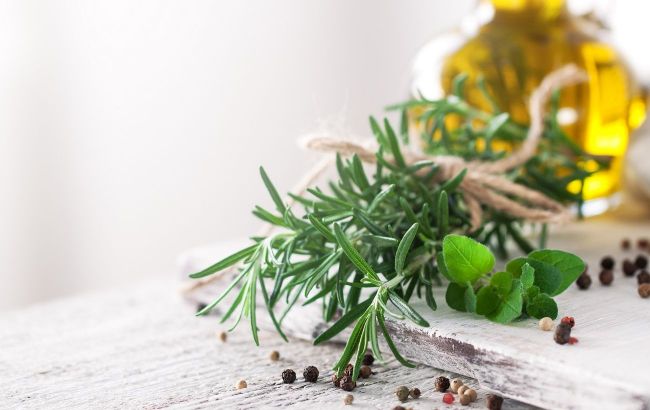From culinary to dermatology: Dietitian explains benefits of rosemary
 Illustrative photo (Photo: freepik.com)
Illustrative photo (Photo: freepik.com)
Rosemary is a member of the Lamiaceae family (Lamiaceae), Salvia rosmarinus. It is an aromatic plant originating from the Mediterranean and cultivated worldwide. Thanks to its numerous biological properties, rosemary has been used for centuries in culinary and medicinal fields.
Dietitian Oleg Shvets explains why rosemary is so valuable.
Rosemary is a member of the Lamiaceae family (Lamiaceae), Salvia rosmarinus. It is an aromatic plant originating from the Mediterranean and cultivated worldwide. Thanks to its numerous biological properties, rosemary has been used for centuries in culinary and medicinal fields.
Rosemary's essential uses
It is believed that the oil of this plant prevents hair loss. In traditional Iranian medicine, the essential oil of rosemary was also used as a sedative and anti-inflammatory agent, particularly for acne. Rosemary is known to absorb ultraviolet light well, has antibacterial and antifungal properties, and helps maintain skin homeostasis.
Researchers are conducting further studies on its anti-inflammatory, antioxidant, anti-infective, and anti-tumor effects.
Key chemical components of rosemary include bitter principle, resin, tannic acid, flavonoids, and volatile oils (borneol, bornyl acetate, camphene, cineole, pinene, and camphor).
Among other important components of rosemary oil are p-Cymene, linalool, gamma-terpinene, thymol, beta-pinene, alpha-pinene, eucalyptol, and carnosic acid. The volatile oils of rosemary are used in various oils and lotions for wound healing and hair growth stimulation. The health benefits of rosemary are typically attributed to carnosic and ursolic acids.
Wound healing
In a 2022 study conducted on 60 adult male rats, researchers found that using ointments based on the essential oil of rosemary leaves accelerates wound healing, reduces inflammation, enhances angiogenesis, and increases collagen fiber density. Previously, this effect on rats was compared in three local compositions based on chitosan, containing tea tree essential oil, rosemary essential oil, or a mixture of both oils. The combined preparation was the most effective in promoting different stages of wound healing, with a significant increase in the percentage of wound area reduction.
Additionally, the results of a 2010 in vivo study demonstrated that local application of rosemary essential oil for three days reduces inflammation, the wound itself, and promotes angiogenesis and granulation tissue regeneration.
Anti-cancer potential
In a 2006 study, rosemary extract administered orally at a dose of 500 mg/kg body weight significantly suppressed the second stage of skin oncogenesis in mice. A study ten years later identified that water-alcohol extract of rosemary demonstrates anti-proliferative action on human melanoma cell line A375. Carnosic and rosmarinic acids are most commonly mentioned as sources of rosemary's anticancer effects.
Hair growth
In early 2023, researchers developed a 1% hair lotion based on methanol extract of rosemary aerial parts, the effect of which was assessed for potential fur growth activity in mice. Using water as control and 2% hair lotion with minoxidil as standard, researchers found that their rosemary hair lotion demonstrated significant fur growth stimulation, exceeding the performance observed in mice receiving the standard preparation.
Rosemary has been used in traditional medicine for hundreds of years, and for over 20 years, it has been a widespread ingredient in cosmetic and cosmeceutical products. Recent discoveries indicate attractive prospects for its use in modern medicine, particularly in dermatology. Further research could provide better justification for the application of rosemary to improve skin and hair health.
This material is for informational purposes only and should not be used for medical diagnosis or self-treatment. Our goal is to provide readers with accurate information about symptoms, causes, and methods of detecting diseases. RBС-Ukraine is not responsible for any diagnoses that readers may make based on materials from the resource. We do not recommend self-treatment and advise consulting a doctor in case of any health concerns.

